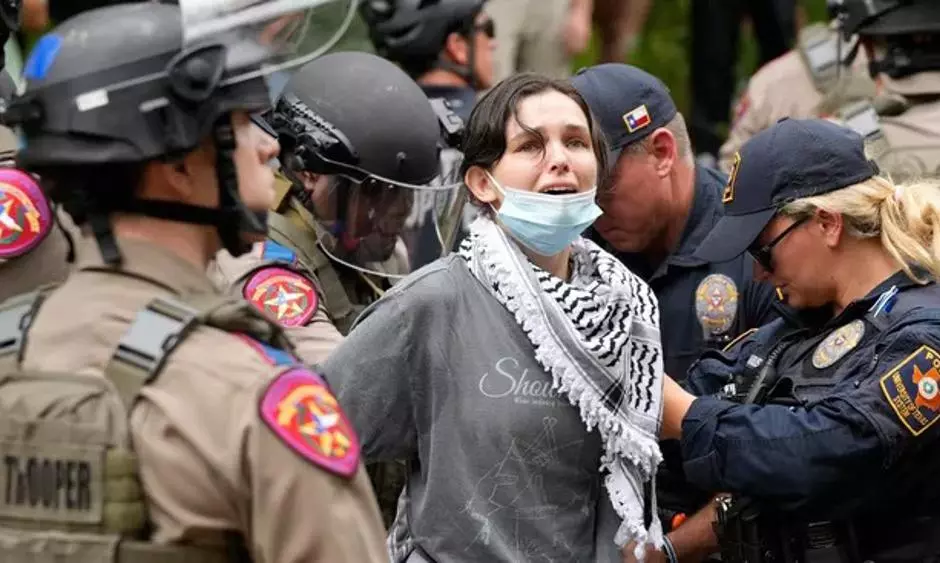
Police quell protests by force as pro-Palestine slogans spread across the US campuses
text_fieldsIn a wave of demonstrations echoing the fervour of the 1960s anti-Vietnam war protests, campuses across the United States have become battlegrounds for a different cause: the conflict in Gaza.
What began as a call for a ceasefire and divestment from Israeli companies has escalated into clashes between protesters and law enforcement, raising concerns about freedom of speech and the right to protest.
At the University of California, Los Angeles (UCLA), the scene resembled a standoff as hundreds of police in riot gear amassed near an encampment of pro-Palestinian protesters. The previous night, the encampment had been violently attacked by masked counter-protesters, leaving at least 15 people injured.
The contrast in police response between the two nights has drawn sharp criticism, with students accusing authorities of retreating or failing to intervene promptly.
Similar scenes unfolded across the country. At Columbia University in New York, police used force to break up a protest encampment that had been a focal point for nearly two weeks. The involvement of law enforcement has sparked outrage among students and faculty, who argue that peaceful protest is a fundamental right.
"We are on the right side of history," declared Rashid Khalidi, a Palestinian American historian and professor at Columbia. "Shame on our leaders, shame on our administrators, for allowing the police onto our campus."
The clashes have not been limited to the coasts. In the heartland, at the University of Wisconsin in Madison, activists clashed with police who dismantled their tents. At Dartmouth College in New Hampshire, an encampment was swiftly removed just hours after it was erected. Arrests have been made, including that of at least one professor.
Critics of the protests have labelled them as anti-Semitic, but organizers, some of whom are Jewish themselves, deny this characterization. They argue that the movement is about defending Palestinian rights and protesting against the violence in Gaza.
Despite the accusations, the protests have garnered significant support. At UCLA, a diverse crowd of students, alumni, and neighbours gathered in solidarity with the pro-Palestinian demonstrators. Ray Wiliani, a local resident, expressed his support, stating, "Enough is enough. We need to take a stand for it."
The crackdown on university protests has not been limited to physical force. In New York, Mayor Eric Adams faced criticism for blaming "outside agitators" for leading the demonstrations. One such individual cited by Adams, Nahla Al-Arian, was not even present at the protests. Al-Arian, a retired teacher, refuted Adams' claims, highlighting the misinformation surrounding both her involvement and her husband's background.
The protests have also prompted debates about the role of universities in global issues. At Columbia University, the group behind the encampment, Columbia University Apartheid Divest, defended their inclusion of individuals from outside the university, rejecting the label of "outside agitator" as a smear tactic.
As the protests continue to escalate, so do concerns about the use of force by authorities. In Tucson, police at the University of Arizona fired "non-lethal" chemical weapons at protesters, while in Dallas, 17 protesters were arrested on campus grounds. Critics argue that such heavy-handed tactics stifle dissent and undermine the principles of academic freedom and free expression.
The conflict in Gaza continues to claim lives and stir emotions on both sides of the debate. For many on university campuses across the United States, the protests are not just about expressing solidarity with Palestine but also about challenging the status quo and demanding accountability from those in power.





